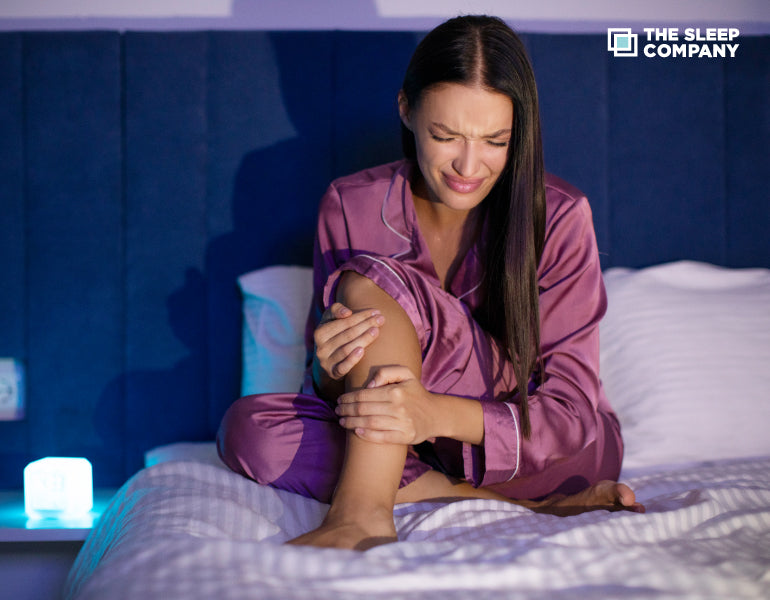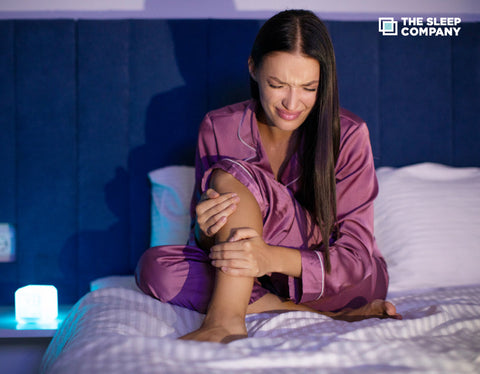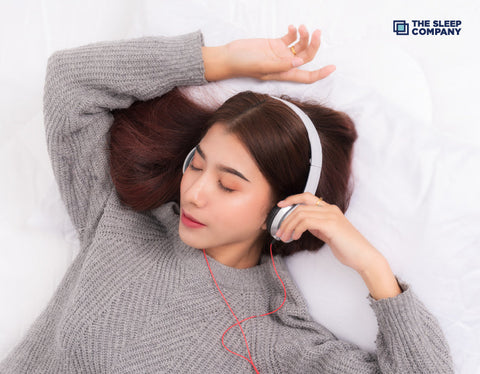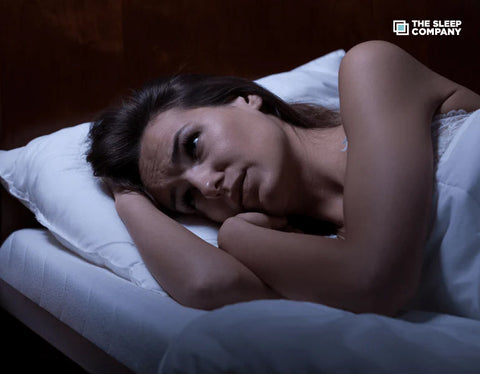My Cart

Restless Legs at Night? Top Remedies for a Better Sleep

Also known as the Willis-Ekbom disease, Restless Legs Syndrome (RLS) is a sleep disorder that leads to uncomfortable sensations in your legs, giving a strong urge to move them.
While it can occur anytime in the evening or night, it can elevate before you hit the sheets.
Usually, people experience mild symptoms but the severity can vary as per the individual.
That said, if you are suffering from RLS, you don't have to compromise on your sleep. There are top remedies to help you achieve a good night's sleep almost effortlessly. Keep reading ahead to know more.
What Is Restless Leg Syndrome?
As mentioned earlier, restless leg syndrome is a condition where you get an uncontrollable urge to move your legs. This is due to sensations like tingling, crawling, or aching that can occur anytime when you are resting, sitting, or lying down, especially in the evening or at night.
When you are suffering from RLS, moving your legs offers a way to temporarily relieve the discomfort. However, this condition can make it hard for you to fall or stay asleep. And, it leads to tiredness during the day.
The exact cause isn’t always clear, but it may be linked to genetics, iron deficiency, or nerve issues. Treatments for RLS include lifestyle changes, supplements, etc.
Causes and Symptoms of Restless Leg Syndrome
Let’s understand more about the causes and symptoms of RLS.
Symptoms of Restless Leg Syndrome
- You get a strong urge to move your legs, especially when resting.
- You may experience uncomfortable sensations like tingling, crawling, itching, and throbbing.
- Your symptoms may worsen in the evening or at night.
- You get temporary relief with movement like stretching and walking.
- You may experience trouble falling or staying asleep due to leg discomfort.
- You go through daytime tiredness or fatigue from poor sleep.
- Sometimes, the symptoms may affect both legs and arms.
Causes of Restless Leg Syndrome
1. Genetics
Genetics can be one cause of RLS. It can run in families, especially if symptoms start before age 40.
2. Iron Deficiency
It is seen that low iron levels in the brain can trigger or worsen symptoms of RLS. Sometimes, the right medications can help you overcome the condition.
3. Nerve Problems
If you are suffering from conditions like peripheral neuropathy or spinal cord issues, it may lead to RLS.
4. Chronic Diseases
Chronic conditions, such as diabetes, kidney failure, and Parkinson ’s disease are associated with RLS. They can be the underlying symptoms.
5. Pregnancy
Hormonal changes during pregnancy, especially in the third trimester, can cause temporary RLS. But it usually goes away.
6. Medications
Some antidepressants, antihistamines, and antipsychotics may trigger RLS symptoms.
7. Lifestyle Factors
Lack of exercise, smoking, and caffeine can lead to RLS.
Note:Along with trying the below remedies, it is essential to speak with a doctor if you notice any symptoms of RLS.
Top Remedies for Restless Legs at Night

Here are a few tips you can try to overcome RLS at night.
1. Stretching and Yoga before Bed
Stretching at night can be extremely beneficial for those suffering from restless leg syndrome. It improves circulation and offers a sense of relaxation.
Here, you must opt for gentle stretches targeting your legs to relieve muscle tension and reduce discomfort.
Simple yoga poses like the child’s pose, forward fold, and legs-up-the-wall pose encourage relaxation and release tightness in the lower body.
Club this with a gentle breathing routine to help you out. This can activate the parasympathetic nervous system. You can do this for about 15-20 minutes before you hit the sheets. It can benefit you both mentally and physically.
2. Massage and Warm Baths
One of the methods to prevent RLS is to calm the muscles. And, what better way than massages or baths to help you out? A gentle massage can improve blood flow, reduce tension, and ease discomfort in the legs. To make the experience even more relaxing, you can use oils like lavender.
In the same way, a warm bath can relax tight muscles and calm the nervous system. You can even add Epsom salts to the bath for magnesium, which is known to support muscle function. This can help you enjoy a good night’s rest.
3. Magnesium and Iron Supplements
Magnesium and iron supplements can help you manage the RLS symptoms. Sometimes, the deficiencies in these minerals can be the reason.
Magnesium helps relax muscles and nerves. This can potentially reduce the twitching and discomfort associated with RLS. It also supports muscle function and promotes better sleep quality.
Iron, on the other hand, is essential for dopamine production, which plays a role in controlling muscle movements. Low iron levels have been linked to RLS, so supplementing with iron may help reduce symptoms. However, it is imperative that you first speak to your doctor before trying this remedy.
4. Avoid Alcohol and Cigarettes
If you are suffering from RLS, alcohol and cigarettes can aggravate the condition. Alcohol interferes with your sleep patterns and can exacerbate muscle discomfort. This leads to more severe RLS symptoms.
Infact, it also affects the central nervous system, which can disrupt the body's ability to manage the sensations associated with RLS.
Cigarettes, on the other hand, contain nicotine, which is a stimulant that can worsen RLS symptoms. It can increase nerve activity and muscle spasms. Therefore, avoiding the two is essential for a good night’s rest.
5. Regular Exercise and Movement
We all know that exercise is a crucial element when it comes to your health. But for people with RLS, exercise can be a technique to manage the symptoms as well. Regular physical activity can improve circulation, strengthen muscles, and help regulate the nervous system, all of which can reduce RLS symptoms.
You can always try the activities of your choice, such as walking, swimming, hitting the gym, etc. However, make sure you opt for something that doesn't lead to overexertion. And, avoid intense workouts before bed.
6. Sleep Hygiene Improvements
One of the crucial things you must focus on with RLS is to improve your sleep hygiene.
When we say sleep hygiene, it includes maintaining a consistent sleep schedule, having a set of pre-calming bedtime rituals, and keeping your sleep environment comfortable.
Therefore, it is always best to invest in a good mattress that offers the right balance between support and comfort. Also, keep the environment cool, dark, and quiet. All of this can help you with better sleep.
7. Chill or Warm Your Legs
Chilling or warming your legs, depending on what fetches you the desired comfort, can reduce the RLS symptoms. It can soothe any discomfort you may be experiencing and promote relaxation.
For chilling your legs, you can try a cold compress or ice pack. This can numb the area and reduce inflammation, which may help ease the sensations of RLS.
To warm your legs, you can try a heating pad or soaking your legs in warm water to relax the muscles and improve blood flow. You can do it before bed to help you with peaceful sleep.
The Final Note
When it comes to a good night's rest with restless leg syndrome, it can feel like a tough task. But remember, the right set of remedies, along with a proper mattress can help.
For people with RLS, it is important to go for something that offers pressure-relieving properties and strikes an excellent balance between comfort and support.
That’s why, The Sleep Company brings you the Smart Ortho Mattress. Known for its pressure-relieving properties, it offers a mix of softness and firmness for the best sleep experience.
Made with the SmartGrid Technology, it can be an excellent choice for you.
Choose The Sleep Company today for the best slumber!
FAQs
Drinks rich in magnesium and iron, like chamomile or peppermint herbal tea can help you out. Also, warm milk can be great due to its calcium content. But if your symptoms are severe, you must consult a doctor.
A few things you can try are stretching exercises, massaging your legs, or applying heat or cold packs. In the above blog, we bring you top remedies, take a look.
There are several reasons for RLS. It can be triggered by deficiencies, pregnancy, stress, certain health conditions, and even lifestyle choices. That said, you can manage this sleep disorder with the right treatment.





























































